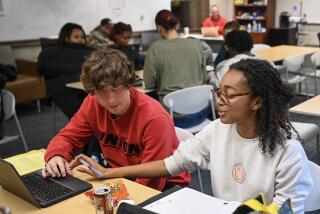EDUCATION : Study Finds Cheating Joins 3 Rs as a Basic College Skill
- Share via
Michael Moffatt, an anthropology professor at Rutgers University, had been an innocent about student cheating. But that was before he surveyed students and discovered, as he put it, that the New Jersey state school “sounds like a place where cheating comes almost as naturally as breathing, where it’s an academic skill almost as important as reading, writing and math.”
Rutgers is not alone, according to Moffatt’s new and controversial study, which suggests that most large, impersonal universities in the United States are hotbeds of dishonesty. Grade-crazed students, he contends, should share blame with uncaring bureaucrats and remote professors who create an alienating atmosphere in much of American higher education.
Experts across the country are divided in reaction to Moffatt’s survey. Some say that the ‘90s appear to be a new era of ethics on campuses, with less obsession with the idea that grades are the only key to a good career. Others say that the Rutgers sampling confirms their own research--and worst fears.
About 45% of the 232 students in Moffatt’s survey reported that they had cheated occasionally, and an additional 33% admitted cheating more regularly. In anonymous essays, respondents described elaborate cribbing and copying techniques worthy of doctoral degrees in subterfuge.
Among hard-core cheaters, the most prevalent method was copying answers from another student’s test either by plan or chance. Next came studying with the help of old tests, on the assumption that professors change multiple-choice exams little if at all between semesters. Using cheat sheets, plagiarizing term papers and stealing tests in advance also were popular methods.
Members of fraternities and sororities appeared more likely to cheat than non-members because of the pressure to share answers with Greek brothers and sisters. And economics majors were the worst offenders, leading Moffatt to ask whether such dishonesty is “anticipatory socialization for modern American business life?”
The study cited many motives, including keeping up with competition for entrance into prestigious graduate schools and simply wanting to party, not study. But the most damaging to academia’s reputation is the widespread motive of revenge against large lecture classes and against professors who value their own research more than teaching.
“With all the inducements for cheating in undergraduate education, my question now has become: Why doesn’t everyone cheat rather than resist temptation?” Moffatt said in an interview.
A national survey in 1987 conducted through UCLA’s Graduate School of Education found a smaller but still worrisome problem: 18% of college sophomores admitted to cheating on an exam, 29% copied homework and 36% did either or both.
In her UCLA doctoral dissertation based on that study, Ann Craig Hanson linked the most frequent cheaters to the materialism that overtook campuses and society in the ‘80s. “There is definitely a climate in which students feel it’s OK to do whatever they need to do to get grades,” she said.
Hanson, now associate dean at Middlebury College in Vermont, found also that cheating was less common at schools with explicit and well-publicized honor codes, where students pledge not to cheat and teachers do not monitor exams.
Rutgers does not have such a code, but about a fourth of the colleges and universities in the nation do, including Stanford.
Sally Cole, Stanford’s judicial affairs officer, deals with code violators and rejects Moffatt’s contention that most large schools breed wholesale dishonesty. Her office handled 32 cheating cases last year, which was double that of the year before, but Cole said an increase in reporting may be the cause.
“Yes, it’s higher than usual, but it’s not off the scale. Thirty-two out of 13,000 students is still a very small number,” she observed.
Nevertheless, she has taken extra steps to inform students about the code and penalties, ranging from suspension for one academic quarter for first violators to expulsion for repeaters.
In fact, experience at Stanford and other universities suggests that the materialism that pushed students to seek grades through any method is now on the wane. Cole said she is seeing “a heightened awareness among students on issues of ethics and standards and how to confront moral choices in life.”
However, Moffatt at Rutgers contends that neither codes nor cultural change deters deception. He has more concrete suggestions: smaller classes, frequently revised exams and more essay tests instead of multiple choice. More contact with professors heightens students’ fears of getting caught and, Moffatt said, students who know a teacher as a human being “feel less willing to rip her or him off.”
More to Read
Sign up for Essential California
The most important California stories and recommendations in your inbox every morning.
You may occasionally receive promotional content from the Los Angeles Times.














